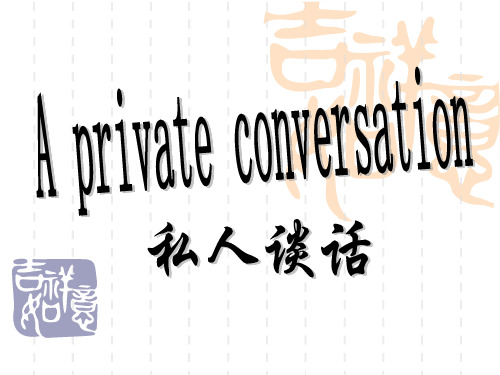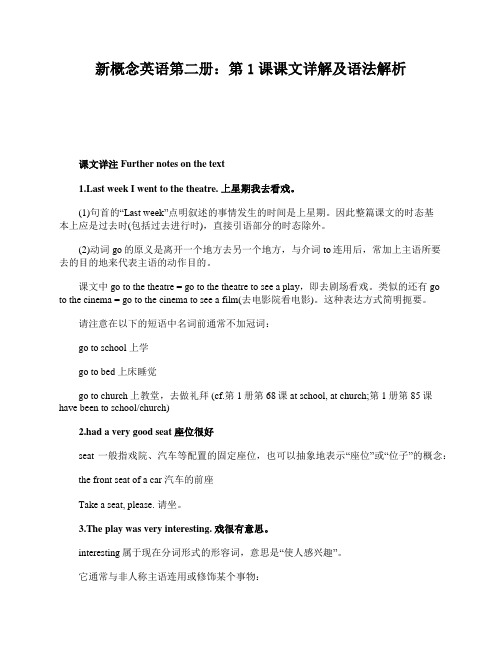新概念英语第二册逐句精讲语言点第1课(2)
- 格式:docx
- 大小:38.17 KB
- 文档页数:3


【导语】新概念英语⽂章短⼩精悍,语句幽默诙谐,语法全⾯系统。
适合各个阶层的⼈群学习参考。
相信有了新概念英语,你也可以成为“⼤神”级别的⼈物!还在等什么?快来加⼊学习吧!⼩编与您⼀起学习进步!新概念英语第2册Lesson1重点语法句型 ⼀、重要句型或语法 1、简单句及其语序 1)句⼦种类:侧重按句⼦结构分为简单句、并列句、复合句 2)句⼦成分:主语、谓语、宾语、定语、状语、补语、表语 3)简单句的基本成分和语序:参考教材第14页的表格和练习 ⼆、课⽂主要语⾔点 Last week I went to the theatre. 可介绍英语句⼦尾重的原则及其运⽤。
注意theatre(剧院)与cinema(电影影)的区别。
I had a very good seat. have a good seat,座位很好。
可简单复习第⼀册⾥学过的have的⽤法。
The play was very interesting. 对⽐interesting和interested,引出使役动词的⽤法:-ed结尾强调“某⼈感到...”,-ing结尾强调“令⼈...”。
I did not enjoy it. 侧重讲enjoy doing的⽤法,提醒后⾯会学习动名词的⽤法。
They were talking loudly. 可以结合第⼀册第73课,复习“形容词+ly”构成副词的构词法。
⽂中类似的⽤法还有angrily何rudely。
I got very angry. 此处可以跟学⽣分析此处的动词如果⽤was,与⽤got,有何差异。
get是变化系动词,更能表达出作者情绪的变化过程,⽽be只是⼀个状态系动词,⽆法体现过程。
I could not hear the actors. 提⽰actor的构词法,引出actress。
也可以做拓展,引出waiter和waitress等。
I turned round. turn round也可以⽤turn around。

新概念英语第二册第1课:A private conversation 新概念英语第二册第1课:A private conversationLesson 1 A private conversation私人谈话First listen and then answer the question.听录音,然后回答以下问题。
Why did the writer complain to the people behind him?Last week I went to the theatre. I had a very good seat. The play was very interesting.上星期我去看戏。
我的座位很好,戏很有意思I did not enjoy it. A young man and a young woman were sitting behind me.但我却无法欣赏。
一青年男子与一青年女子坐在我的身后They were talking loudly. I got very angry. I could not hear the actors. I turned round.大声地说着话。
我非常生气,因为我听不见演员在说什么。
我回过头去I looked at the man and the woman angrily. They did not pay any attention.怒视着那一男一女,他们却毫不理会。
In the end, I could not bear it. I turned round again. ‘I can't hear a word!’ I said angrily.最后,我忍不住了,又一次回过头去,生气地说:“我一个字也听不见了!”‘It's none of your business, ’ the young man said rudely. ‘This is a private conversation!’“不关你的事,”那男的毫不客气地说,“这是私人间的谈话!”New words and expressions 生词和短语private(title)adj. 私人的angry新概念英语第二册第1课:A private conversation adj. 生气的conversationn. 谈话angrilyadv. 生气地theatren. 剧场,戏院attentionn. 注意seatn. 座位bear(bore, borne)v. 容忍playn. 戏businessn. 事loudlyadv. 大声地rudelyadv. 无礼地,粗鲁地Notes on the text课文注释1 go to the theatre,去看戏。

新概念英语第二册:第1课课文详解及语法解析课文详注 Further notes on the textst week I went to the theatre. 上星期我去看戏。
(1)句首的“Last week”点明叙述的事情发生的时间是上星期。
因此整篇课文的时态基本上应是过去时(包括过去进行时),直接引语部分的时态除外。
(2)动词go的原义是离开一个地方去另一个地方,与介词to连用后,常加上主语所要去的目的地来代表主语的动作目的。
课文中go to the theatre = go to the theatre to see a play,即去剧场看戏。
类似的还有go to the cinema = go to the cinema to see a film(去电影院看电影)。
这种表达方式简明扼要。
请注意在以下的短语中名词前通常不加冠词:go to school 上学go to bed 上床睡觉go to church 上教堂,去做礼拜 (cf.第1册第68课at school, at church;第1册第85课have been to school/church)2.had a very good seat 座位很好seat一般指戏院、汽车等配置的固定座位,也可以抽象地表示“座位”或“位子”的概念:the front seat of a car 汽车的前座Take a seat, please. 请坐。
3.The play was very interesting. 戏很有意思。
interesting属于现在分词形式的形容词,意思是“使人感兴趣”。
它通常与非人称主语连用或修饰某个事物:This is an interesting book/idea.这是一本有趣的书/一个令人感兴趣的主意。
4.…were sitting behind me. They were talking loudly. ……坐在我的身后,大声地说着话。

practice : 训练, progress : 进步861practiceadvice adviseIf you practice more, then you can make great progress.五项综合训练技能listening : 听力speaking : 说话grammar : 语法writing : 写作reading : 阅读translation : 译knowledge +skillsLesson 1 A private conversation私人谈话【New words and expressions】(12)1private [ ☐❒♋✋✋♦] adj. 私人的conversation[ ⏹☜♦♏✋☞☎☜✆⏹] n. 谈话theatre [ ✋☜♦☜☎❒✆] n. 剧场,戏院seat [♦♓♦] n. 座位play [☐●♏✋] n. 戏loudly[●♋◆♎●✋] adv. 大声地angry[ ✌⏹♈❒✋] adj. 生气的angrily [ ✌⏹♈❒✋●✋] adv. 生气地attention[☜♦♏⏹☞☎☜✆⏹] n. 注意bear [♌♏☜☎❒✆] v. 容忍bore borne 或born bearing,bearsbusiness[ ♌✋⏹✋♦] n. 事rudely [❒◆♎●✋] adv. 无礼地,粗鲁地★private adj.私人的①adj. 私人的private life 私生活private school 私立学校It's my private letter. (如果妈妈想看你的信)It's my private house. (如果陌生人想进你的房子)②adj. 普通的private citizen 普通公民I‟m a private citizen. (citizen n. 公民)③ n.士兵;二等兵.美国陆军或海军陆战队的非士官军衔,低于一等兵private soldier 大兵《Private Ryan》(《拯救大兵瑞恩》)public adj. 公众的,公开的(private的反义词)public school 公立学校public letter 公开信public place 公共场所privacy n.隐私It‟s privacy. 这是我的隐私!(不愿让别人知道的) Private adj. 1. 个人的,私人的= personale.g. a private care.g. a private garden2. 私营的,私立的e.g. New Oriental School is a private school.反义词:public adj. 公开的,公立的e.g. a public letter; a public placein private 私下里,单独地对应:in public 公开地e.g. She wanted to talk to me in private rather than in public.[script]Rachel: Ross, could I talk to you in private?Ross: Sure, you want to go upstairs?★conversation n.谈话have a + talk/chat/dialogue/conversation/gossip 名词变动词conversation 一般用于正式文体中, 内容上往往不正式subject of conversation 话题They are having a conversation.talk 内容可正式可不正式, 也可以私人Let‟s have a talk.dialogue[ ♎♋♓☜●♈] 对话, 可以指正式国家与国家会谈China and Korea are having a dialogue.chat[♦☞✌♦]闲聊,就是北京人说的“侃”,说的是无关紧要的事。

Lesson One A private conversation 一、每课一句An hour in the morning is worth two in the evening.一日之计在于晨.二、单词1.private反义词public(公开的,公众的)Private school(私立学校),Public school(公立学校)2.conversation n.谈话,话题= talk with sb.=chat with (聊天)例句:It’s our favourite subject of conversation.(注subject :话题,学科、主语)3.theatre (=theater)4.play n.戏,剧例: see a play in the theatre5.seat n (sit v.)6.angrybe angry with sb. 和某人生气be angry with sb. at sth 和某人因为某事生气7.attention 不可数名词pay attention to n./doing 注意做某事pay no attention to n./doing 一点都没注意pay much attention to n./doing 多加留心,多注意8.bear n.熊v.容忍(bore ,borne)类似单词:beer(啤酒),dear(亲爱的)同义词:stand(容忍),(stood,stood)stand doing sth 容忍做某事例句: I can’t stand it. 我一点不喜欢.9.business(ness名词后缀) 事;商业;生意business man商人; business woman 女商人10.k ey n.钥匙the key to the door键盘keyboard答案the key to the question = the answer to the question 关键的,重点的key school 重点学校11.r ude adj.无礼的反义词:polite; 近义词: impolite(p 开头的词,否定前缀im) Be rude to sb. 对…无礼Be friendly to sb. 对…友好Be polite to sb. 对…有礼貌注:否定前缀就当没看见,含有否定前缀的不是否定词。
新概念英语第二册逐句精讲语言点第1课 (4)Lesson 1 A private conversation课文内容:Last week I went to the theatre. I had a very good seat. The play was very interesting. I did not enjoy it. A young man and a young woman were sitting behind me. They were talking loudly. I got very angry. I could not hear the actors. I turned round. I looked at the man and the woman angrily. They did not pay any attention. In the end, I could not bear it. I turned round again. 'I can't hear a word!' I said angrily.'It's none of your business, ' the young man said rudely.'This is a private conversation!'本文语法:简单陈述句语法归纳:一个完整的简单陈述句一般包括主语+谓语(+宾语+方式状语+地点状语+时间状语),其中状语可前置于句首。
精讲笔记:10.I look at the man and the woman angrily.我生气的看着那一对男女。
语言点辨析:see,watch,look,look at1)see 看见(结果):please see who is knocking.去看看谁在敲门。
2)watch 观看(动态):He is watching the crowd go by.他注视着人群走过。
逐句精讲新概念英语第二册:第一课私人谈话Lesson 1 A private conversation课文内容:Last week I went to the theatre. I had a very good seat. The play was very interesting. I did not enjoy it. A young man and a young woman were sitting behind me. They were talking loudly. I got very angry. I could not hear the actors. I turned round. I looked at the man and the woman angrily. They did not pay any attention. In the end, I could not bear it. I turned round again. 'I can't hear a word!' I said angrily.'It's none of your business, ' the young man said rudely. 'This is a private conversation!'本文语法:简单陈述句语法归纳:一个完整的简单陈述句一般包括主语+谓语(+宾语+方式状语+地点状语+时间状语),其中状语可前置于句首。
逐句精讲:st week I went to the theatre.上星期我去看戏。
语言点1 时间状语开门见山,点明时态为过去时,因而谓语动词go to使用过去式went to。
语言点2 在theatre,cinema,picture等名词前一定要加定冠词the。
如:go to the theatre/play去看戏;go to the cinema/movies去看电影(英/美);go to the pictures/films去看电影;be at the theatre/cinema在戏院看戏/在电影院看电影。
新概念英语第二册逐句精讲语言点第1课(2)
Lesson 1 A private conversation
课文内容:
Last week I went to the theatre. I had a very good seat. The play was very interesting. I did not enjoy it. A young
man and a young woman were sitting behind me. They were
talking loudly. I got very angry. I could not hear the actors.
I turned round. I looked at the man and the woman angrily. They did not pay any attention. In the end, I could not bear it. I turned round again. 'I can't hear a word!' I said angrily.
'It's none of your business, ' the young man said rudely. 'This is a private conversation!'
本文语法:简单陈述句
语法归纳:一个完整的简单陈述句一般包括主语+谓语(+宾语+
方式状语+地点状语+时间状语),其中状语可前置于句首。
精讲笔记:
4.I did not enjoy it.
我却无法欣赏。
语言点1 did not常用于正式写作中,其缩写didn't常在口语中
使用,类似有:cannot/can not=can't,could not=couldn't,do
not=don't,will not=won't,shall not=shan't,have not=haven't等。
语言点2 enjoy的用法:
1)enjoy sth.从某事物中得到精神上的娱乐或快乐,比like意义要深得多。
enjoy music享受音乐;enjoy dinner享受宴会;enjoy life享受生活
2)enjoy doing sth.喜欢做某事。
enjoy swimming喜欢游泳;enjoy fishing喜爱钓鱼
3)一般不可说enjoy sb.,如:This morning I enjoyed my English teacher.是明显错误的句子。
但enjoy oneself(反身代词)是特例,在请客人吃菜时可说Enjoy yourself!
5.A young man and a young woman were sitting behind me.
一青年男子与一青年女子坐在我的身后。
语言点1 A young man and a young woman为主语,交代谁坐在我的后面,他们必然和故事的发展有直接关系。
语言点2 形容词修饰名词作定语一般放在被修饰名词之前,如young man,但如果是介词短语形容词短语作定语或修饰名词的定语则放在被修饰名词之后。
例:a man in the room(介词短语)在房间里的一个男人。
Is it a problem difficult to solve(形容词短语)?这是个难解决的问题吗?
语言点3 本句时态:were sitting为过去实行时,与sat(一般过去时)不同
语言点4 behind反义词:in front of。
原句可改写为I was sitting in front of them.
6.They were talking loudly.
他们俩在一直在那里大声地交谈着。
语言点1 were talking为谓语动词部分,loudly是副词,副词一般修饰动词放在其后。
例:hit hard重重地打;speak slowly慢条斯理地说;touch softly温柔地抚摸
语言点2 were talking过去实行时,为何不用"They talked loudly."呢?因为be doing是介绍背景时的选择能够起到增强印象的效果。
比较:I speak English.我讲英语。
/I am speak English now.我现在正在讲英语。
7.I got very angry.
我很生气。
语言点比较I was very angry.我那时很生气。
/I got very angry.我变得很生气。
用get表示“变得”,强调变化的过程。
get在作“变得”讲时常后接形容词,如got old变老;got hot变热;got hungry感到饥饿;均有肩井的意味。